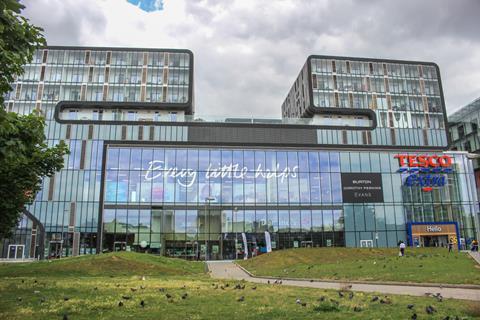Part of recouped amount is believed to relate to Woolwich Central scheme in south-east London
Willmott Dixon has said that it recovered more than £20m for cladding remediation work last year with part of that figure understood to be related to its dispute on a £250m scheme in south-east London called Woolwich Central.
The contractor said the figure related to “net recoveries from third parties of over £20m against those historic provisions during the year”. The firm has previously said its bill to fix legacy cladding issues across several schemes was £62m.
The firm began action in 2023 against five companies it claims are responsible for defects with the external wall system on the Woolwich Central scheme which is owned by Tesco.

Willmott Dixon did not specify which jobs the £20m had been recovered on but a proportion of it is believed to relate to Woolwich Central.
Woolwich Central consists of an 84,000 sq ft Tesco superstore and seven residential tower blocks, covering more than 250 flats, the largest of which is nine storeys. It was completed at the start of 2014.
In its 2023 accounts, filed at Companies House last summer, the firm said it would cost £48m to fix, up from a previous estimate of £44m.
It is due to file its 2024 accounts at Companies House next month – which is likely to include an updated figure on the cost of repairs at Woolwich Central – but in a statement ahead of its results being filed the firm said the £20m had been booked as an exceptional item which meant it returned to a pre-tax profit of £47m from a £14.4m pre-tax loss last time.
Willmott Dixon had put firms on notice in 2022 that it would go after those it said were avoiding responsibility for footing the bill on cladding repair work, in a sign of the wider implications for the industry over the issue of who pays for these kind of repairs following the Grenfell Tower fire eight years ago.
In its 2022 accounts, executive chairman Rick Willmott pointed the finger at firms in several sectors, including designers, fire engineers and insurers, who, he said, “so far have not faced up to their responsibilities or obligations” regarding the cost of recladding work that is now required in order to comply with building safety legislation.
Meanwhile, turnover at Willmott Dixon last year stayed flat at £1.2bn with construction revenue also staying flat at £1bn with the firm’s fit out business seeing income rise 12% to £147m.
Chief executive Graham Dundas said: “We’re delighted to have returned to profit as we expected in 2024, responding strongly to a difficult economic environment in 2023.
“Our strategies, including a more rigorous focus on contract selection, are generating much improved consistency in our financial performance.”
The firm said it won a record £1.3bn in contracts last year with cash at the bank and in hand was up £6m to £121m.


























No comments yet